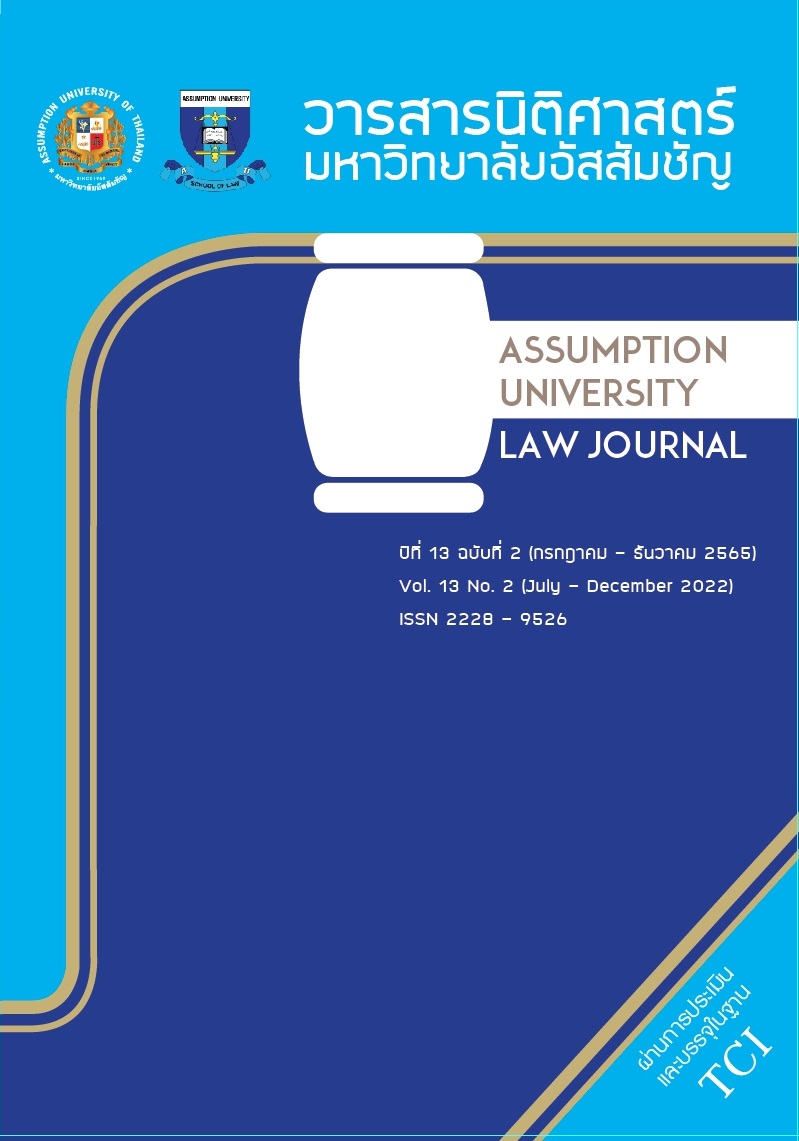ความเป็นมาของกฎหมายแพ่งและพาณิชย์ว่าด้วยหนี้และมูลแห่งหนี้
Background of Civil and Commercial Law on Debt and Causes of Debt
Keywords:
หนี้, มูลแห่งหนี้, กฎหมายแพ่งและพาณิชย์ว่าด้วยหนี้, Debt, Causes of Debt, Civil and Commercial Law on DebtAbstract
บทคัดย่อ
กฎหมายเกี่ยวกับหนี้ของไทยมีพัฒนาการมาอย่างยาวนาน ซึ่งในสมัยกรุงศรีอยุธยา มีกฎหมายที่สาคัญคือพระอัยการกู้ยืมที่เจ้าหนี้สามารถบังคับเอากับเนื้อตัวร่างกายของลูกหนี้ได้ จนกระทั่งในสมัยกรุงรัตนโกสินทร์ รัชกาลที่ 4 ได้ยกเลิกเปลี่ยนวิธีการบังคับชาระหนี้มาเป็นวิธีการพิพากษาคุมขังตัวลูกหนี้เมื่อลูกหนี้ไม่ชาระหนี้แทน และในเวลาต่อมาได้มีการออกพระราชบัญญัติแก้ไขเพิ่มเติมลักษณะกู้หนี้ รศ.110 โดยนาวิธีการล้มละลายมาบังคับใช้ครั้งแรกในไทย กล่าวคือหากลูกหนี้ไม่สามารถชาระหนี้ได้ เจ้าหนี้มีสิทธิร้องขอต่อศาลให้เจ้าพนักงานเก็บรวบรวมทรัพย์สินของลูกหนี้ทั้งหมดมาแบ่งชาระแก่เจ้าหนี้ทั้งหลาย และในพระราชบัญญัติฉบับนี้ได้มีการยกเลิกวิธีการบังคับชาระหนี้จากเนื้อตัวร่างกายของลูกหนี้ทั้งหมดรวมถึงการจาคุกแทนการชาระหนี้ด้วย และต่อมาเพื่อให้กฎหมายมีความเป็นสากลมากยิ่งขึ้นจึงได้มีการจัดทาประมวลกฎหมายแพ่งและพาณิชย์ โดยได้รับอิทธิพลมากจากระบบกฎหมายซีวิลลอว์ ของประเทศต่างๆ ไม่ว่าจะเป็นกฎหมายแพ่งของเยอรมัน ญี่ปุ่น ฝรั่งเศส และสวิสเซอร์แลนด์ จึงทาให้ที่มาของมูลหนี้ก็มีการเปลี่ยนแปลงจากเดิม โดยปัจจุบันหนี้นั้นอาจมีที่มาจากนิติกรรม นิติเหตุ หรือบทบัญญัติของกฎหมาย
ABSTRACT
Thai debt law has been progressively developed for centuries. In Ayutthaya period, there was a loan prosecutor law that the creditors can claim on the debtor's body. Until Rattanakosin period, King Rama IV canceled this repayment method to apply the imprisonment to the debtors when they were unable to pay the debt instead. Later, the Debt Recovery Act, Ror Sor.110 was issued by applying the bankruptcy method to be enforced for the first time in Thailand. That is, if the debtor is unable to pay the debt, the creditor has the right to request the court to officially confiscate all the debtor's property to distribute to all creditors. In this Act, all compulsory debt repayment methods with the debtor's body and imprisonment have been canceled. To make the law more universal, the Civil and Commercial Code was initialed and influenced by the civil law system from various countries, civil law of Germany, Japan, France, and Switzerland. As a result, the source of debt has been changed from the original. The debt now may come from juristic acts, legal causes, or provisions of the law.
Downloads
Published
Issue
Section
License
- บทความทุกเรื่องได้รับการตรวจทางวิชาการโดยผู้ทรงคุณวุฒิ (Reader) จากภายในและนอกมหาวิทยาลัย
- ความคิดเห็นใดๆ ที่ลงตีพิมพ์ในวารสารกฎหมายคณะนิติศาสตร์ มหาวิทยาลัยอัสสัมชัญ เป็นของผู้เขียน (ความคิดเห็นใดๆ ของผู้เขียน กองบรรณาธิการวารสารกฎหมายคณะนิติศาสตร์ มหาวิทยาลัยอัสสัมชัญไม่จำเป็นต้องเห็นด้วย)
- กองบรรณาธิการวารสารกฎหมายคณะนิติศาสตร์ มหาวิทยาลัยอัสสัมชัญ ไม่สงวนสิทธิในการคัดลอก แต่ให้อ้างอิงแสดงแหล่งที่มาด้วย


